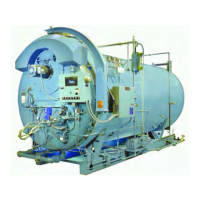Chapter 8 — Inspection and Maintenance
8-2 Part No. 750-184
Note: For more information on your flame safeguard system,
refer to the appropriate manual that was provided with
your boiler
Inspection and maintenance should be performed only by trained
personnel who are familiar with this equipment. Failure to follow
these instructions could result in equipment damage.
A. GENERAL
A well-planned maintenance program will help avoid unnecessary down-
time or costly repairs, promote safety, and aid boiler inspectors. An
inspection schedule with a listing of procedures should be established. It is
recommended that a boiler room log or record be maintained. Recording of
daily, weekly, monthly, and yearly maintenance activities provides a valuable
guide and aids in obtaining economical and lengthy service from Cleaver-
Brooks equipment. It is important to realize that the frequency of inspection
will depend on variable conditions such as load, fuel, system requirements,
boiler environment (indoor/outdoor), etc.
Good housekeeping helps maintain a professional appearing boiler room.
Only trained and authorized personnel should be permitted to operate,
adjust, or repair the boiler and its related equipment. The boiler room should
be kept free of all material and equipment not necessary to the operation of
the boiler or heating system.
Even though the boiler has electrical and mechanical devices that make it
automatic or semi-automatic in operation, the devices require systematic
and periodic maintenance. Any automatic feature does not relieve the
operator from responsibility, but rather frees the operator from certain
repetitive chores providing time to devote to upkeep and maintenance.
Alertness in recognizing an unusual noise, improper gauge reading, leaks,
etc., can make the operator aware of a developing malfunction and permit
prompt corrective action that may prevent extensive repairs or unexpected
downtime. Any leaks - fuel, water, steam, exhaust gas - should be repaired
promptly and under conditions that observe necessary safety precautions.
Preventive maintenance measures, such as regularly checking the tightness
of connections, locknuts, setscrews, packing glands, etc., should be
included in regular maintenance activities.
Periodic Inspection
Insurance regulations and local laws require periodic inspection of the
pressure vessel by an authorized inspector. Section H of Chapter 3 contains
information relative to the inspection.
Inspections are usually, though not necessarily, scheduled for periods of
normal boiler down time, such as an off season. This major inspection can
often be used to accomplish maintenance, replacement, or repairs that
cannot easily be done at other times. Inspection also serves as a good basis
for establishing a schedule for annual, monthly, or other periodic
maintenance programs.
While the inspection pertains primarily to the waterside and fireside surfaces
of the pressure vessel, it provides the operator an excellent opportunity for

